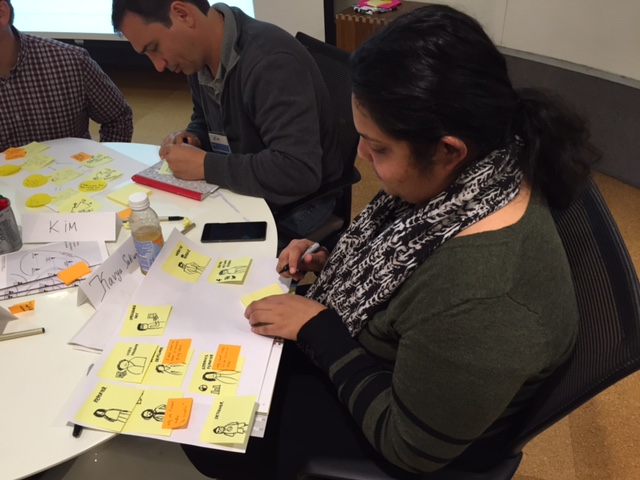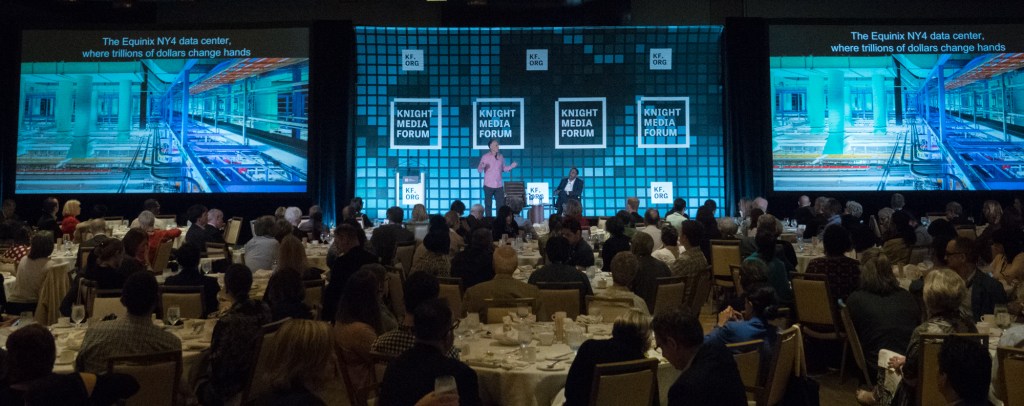
11 innovative media and information projects receive support from Knight Prototype Fund

Kavya Sukumar of Vox is developing user stories for the Chitram project. (Photo by Eva Pereira)
This post has been updated to reflect the correct name of the “This American Life” project, Audioshare. An earlier post referred to it as Clipper.
Eleven early-stage media and information projects will receive support through the Knight Prototype Fund. They join a cohort of 20, which includes nine prototypes that we announced earlier this year as part of the winners of the Knight News Challenge on Data.
In November 2015, we received over 500 applications for the Prototype Fund, while also reviewing applications for the Knight News Challenge on Data. With the input of outside reviewers and after interviews with applicants from across the U.S., we selected 20 prototypes total, with ideas focused on topics such as podcasts, civic data, digital literacy and privacy tools. Each project will receive $35,000.
We recently invited the team leaders for each project to Pittsburgh last month to participate in a two-day human-centered design workshop at the LUMA Institute where they learned methods for designing tools and products with the input of beneficiaries and end users in mind. After six months, the teams will come together to share what they have learned and built. We look forward to sharing their projects with you.
Many of them are off to a strong start. A team from the Missouri School of Journalism is leading the Access Missouri project, which aims to improve transparency and good governance through a database of information about state legislation, lawmakers and influencers.
Another project, Audioshare, led by the “This American Life” team at NPR, is developing a podcast sharing and sound editing tool that will allow listeners to snip short selections of audio, convert them into video with word-for-word transcription, and share them on social media. These teams join a growing network of prototype winners.
Since the launch of the Knight Prototype Fund in 2012, Knight Foundation has provided more than $9 million in seed funding for media and information projects. Several prototypes have gone on to receive more substantial funding from Knight:
-
After receiving seed funding to develop a universal screening tool to determine eligibility for public benefits, the mRelief team later received $250,000 for the Documents Empowerment Project through the Knight News Challenge on Data.
-
HeartMob initially received funding to develop a pilot of its platform for reporting online harassment. After validating the idea through user testing, the project received $516,000 to further develop the platform.
-
Hearken, which uses mobile technology to promote audience-driven storytelling, started as a prototype project and went on to receive a $50,000 investment from the Knight-supported media incubator Matter.
Congratulations to the winners. Here are the 11 projects joining this Knight Prototype Fund round:
Access Missouri by University of Missouri School of Journalism (Project lead: Nathan Lawrence | Columbia, Mo.): Making it easier for journalists and others to access and find accurate, comprehensive and up-to-date information about Missouri legislation, lawmakers and their influencers.
Authenticon by Benetech (Project lead: Collin Sullivan | Palo Alto, Calif.): Supporting digital privacy through a free, open source tool that makes it easier to verify a person’s cryptographic or secure online identity.
Chitram (Project lead: Kavya Sukumar | Washington, D.C.): Making it easier for anyone to create data visualizations through an open source tool that creates animated video snippets of graphs and charts from datasets.
This American Life’s Audioshare Tool by This American Life (Project lead: Stephanie Foo | New York): Helping people share and discover audio stories more easily with a tool that will allow users to easily capture a short selection of a podcast or other audio, convert it into a video with word-for-word transcription, and share it to social media.
One-liner by Institute for Nonprofit News (Project lead: Ryan Nagle | Chicago): Helping newsrooms improve website performance and better understand the privacy implications of third-party services (analytics tools, advertising networks, social gadgets, etc.) through a dashboard that allows them to manage and evaluate these tools.
Open Privacy Project by University of Miami (Project lead: Kim Grinfeder | Miami): Encouraging more transparency around the use of personal data with free tools that provide simple, standardized ways to to simplify and visually describe privacy policies thereby informing users how their data is collected, used and protected.
RevEx: A Data Visualization Tool To Find Stories in Millions of Internet Reviews by New York University (Project lead: Enrico Bertini | New York): Helping journalists explore millions of online reviews to create stories about how people interact with professionals, institutions and businesses.
Satchel (Project lead: Beau York | Jackson, Miss.): Making podcasts easier to find through a platform that will allow location-based searches and allow people to share content through an embedded player on social media.
Singularity HUB’s Open Source Virtual Research Assistant for Writers and Journalists by Singularity University (Project lead: David Hill | Moffett Field, Calif.): Helping content creators discover relevant information faster and more efficiently through a tool that will filter data from news feeds, extract information from metadata and keyword use, and condense it into article summaries.
Spectrogram Tool for Public Input (Project lead: Catherine Bracy | Oakland, Calif.): Promoting more representative public decision-making processes through a digital platform that government officials can use as a tool to turn citizen opinion into actionable and more transparent data.
Visible Contracts by ThirdSpace (Project lead: Amanda Levinson | Philadelphia): Making Philadelphia’s procurement data more transparent and easy to understand by using the city’s open data to build online interactive visualizations.
Eva Pereira is a media innovation associate at Knight Foundation. Follow her on Twitter @evanpereira and email her at [email protected].
Recent Content
-
Artsarticle ·
-
Artsarticle ·
-
Communitiesarticle ·


